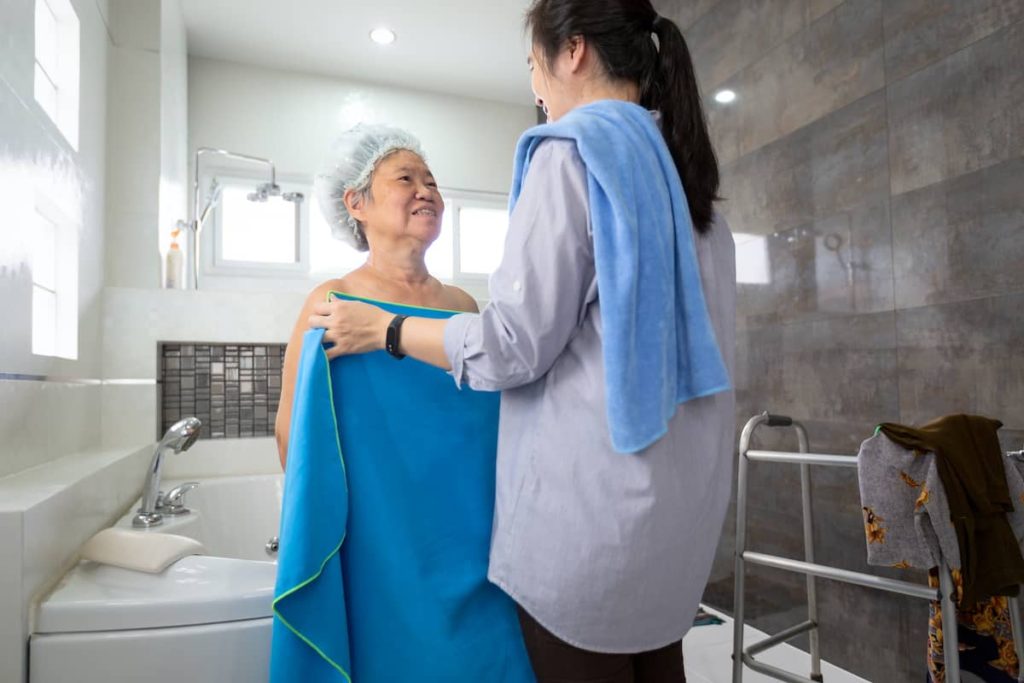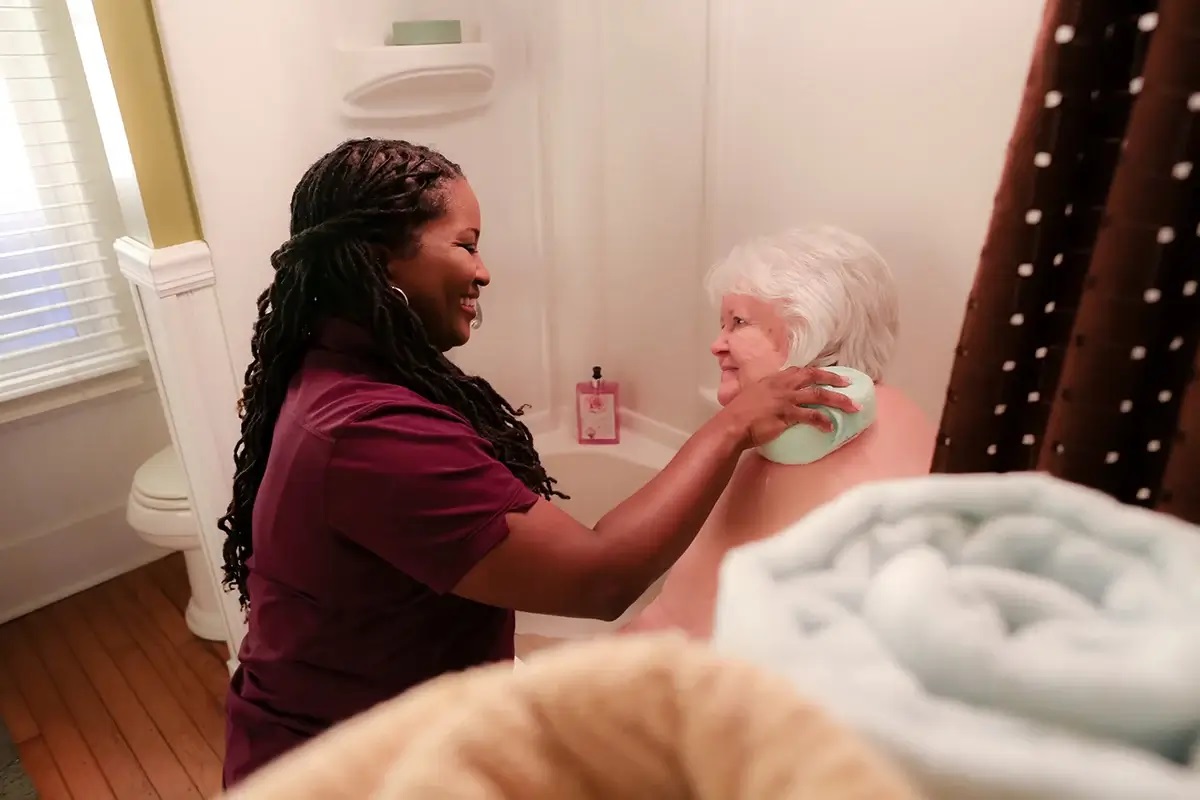Why Do the Elderly Not Want to Bathe?
Senior citizens often avoid bathing as doing so is uncomfortable. Disrobing, preparing the shower or bath, cleaning oneself, drying off and getting dressed again takes time and effort. Some senior citizens lack the balance, strength and coordination necessary to bathe and dress. Other seniors are in too much pain to bathe in a shower or bath.
In other situations, seniors who live with a roommate, in a group setting or those who require assistance are too modest to bathe. In some cases, seniors simply lose their sense of smell and do not realize they have body odor, meaning they are less likely to consider bathing. In other cases, seniors forget about bathing, sometimes going days or even weeks without a shower or bath.
How do you approach an elderly person about personal hygiene?
Approaching a senior citizen about his or her personal hygiene is not easy. Most seniors are highly sensitive about their personal hygiene simply because no one wants to be told that they smell funky, especially by an adult child or another younger relative with less life experience. However, if you genuinely care about the senior in your life, you will tell them when their personal hygiene has become problematic. After all, a senior citizen with poor personal hygiene will struggle to make friends and live a life highlighted by friendships as opposed to solitude.
Carefully broach the subject of personal hygiene, noting how you would enjoy spending more time with the senior in your life if he or she made an effort to smell good. Stress the fact that others would also be open to spending more time with him or her after more frequent bathing and it just might be enough to convince your elderly relative to shower at least once each week or every two three days.
If you are still hesitant to broach the subject or if you can’t communicate the importance of bathing, consider bringing in the treating doctor, a nurse or other medical professional who has spent time with your aging relative. Have the medical professional chime in on the importance of regular bathing and it will go a long way in convincing your family member to begin bathing at a regular frequency.
How to convince senior to bathe
As noted above, one of the best ways to convince a senior citizen to bathe is to make it clear that people want to be around those who smell good and look halfway decent. If your loved one is aware his social circle will expand and he or she will have more people to talk to, it just might be enough to inspire bathing at a higher frequency.
Convincing a senior to bathe might be as easy as providing reassurance. Add grab bars along with handles to the bathroom, shower and hallways so he or she has something to hold onto and it might be enough to increase the frequency of showering or bathing. Alternatively, you can also coordinate at-home care in which a medical professional helps your loved one bathe, dress, groom him or herself and complete other components of personal hygiene.
How to bathe an elderly person
Bathing an elderly person is inherently awkward yet essential to his or her health and well-being. When in doubt, lean on an in-home health care services provider to bathe your aging relative. However, if you must bathe your elderly family member on your own, mind the small stuff of the project. Use ample illumination, non-slip stickers at the tub’s bottom and non-slip rugs outside of the tub. Use basic body wash as opposed to bar soaps that create a film that can trap bacteria.
If the senior in your life expresses resistance to any part of the bathing process, take note of it and start brainstorming ways around the hurdle such as offering a privacy towel, using a certain type of shampoo or using a washcloth instead of another item for scrubbing. Above all, be gentle when bathing the senior in your life to prevent potential abrasions and irritation to the skin.
Bathing senior who has dementia
Bathing a senior saddled by dementia is a bit more challenging than bathing one who does not have mental health challenges. Dementia sufferers forget when they last bathed, who did the bathing and whether it included soap and/or shampoo.
Bathing a patient with Alzheimer’s disease is easier if you shape the process in accordance with his or her unique bathing habits. Perform the bathing at his or her selected time, progressing through soaping and shampooing is his or her preferred order and prioritizing safety throughout the entirety of the project. Grab bars, a sturdy shower chair and a bath mat will help keep your loved one safely in position throughout the bathing process.

Elderly shower alternatives
Take a look at the shower alternatives for elderly individuals on the market and you will find plenty of options. As an example shower chairs are perfect for those who cannot stand in the shower.
How to bed bath elderly
Giving an elderly family member a bed bath should not take up hours of time. Approach this project in a strategic manner or simply outsource it to at-home care providers and your elderly relative will live with that much more dignity.
Bath sponges, washcloths, towels, soap and wash basins will be necessary. One of the basins serves as the receptacle for the sudsy water while the other is used for rinsing. Let the patient undress and perform light self-bathing if possible. Use the sponge and suds to clean the areas the patient cannot reach.
Bathing assistance device for elderly
Bathing assistance devices for elderly are available in a wide variety of sizes and shapes, some of which are sure to be perfect for your relative’s needs. From bath chairs to bath lifts, shower benches, portable showers and other bathroom assistance devices for elderly, the options are seemingly endless. Shower chairs are especially helpful for seniors who want to sit and let the shower run above them, serving as a form of comfortable slip prevention.
Bath lifts are particularly helpful for those who want to sit and shower in the bath basin with the utmost security and comfort. This bath assistance device for elderly is ideal for patients who cannot lift/lower themselves out of the tub and also for securing elderly individuals into chairs for showering so they do not slump/fall into the water.
In-home care elderly bathing service
There is no shame in asking for assistance from medical professionals for elderly care and bathing. Your senior needs and deserves regular bathing along with customized medical care to maintain a respectable quality of life. Tap into the power of at-home care complete with an elderly bathing service and your family member will live with dignity through his or her golden years.


